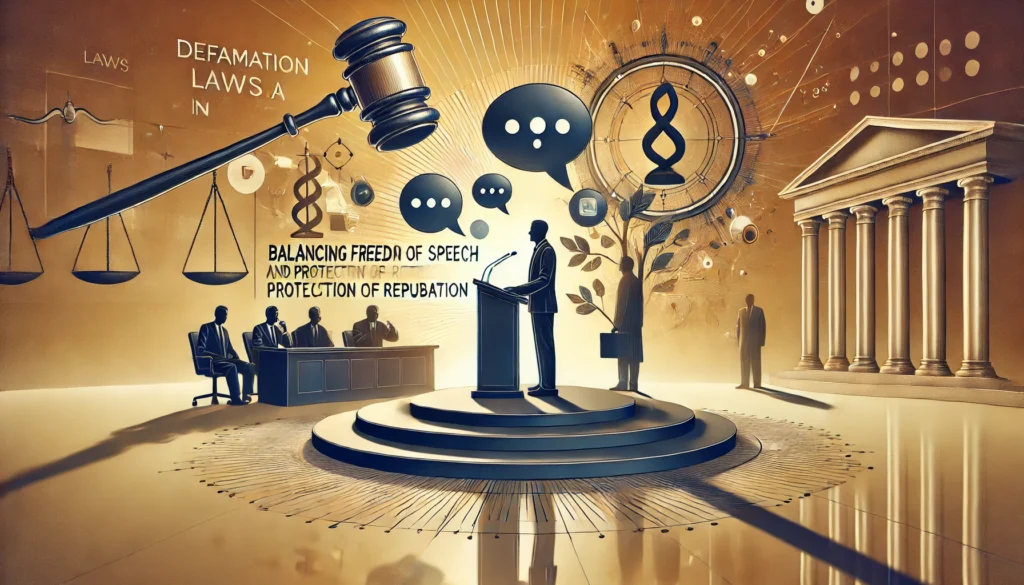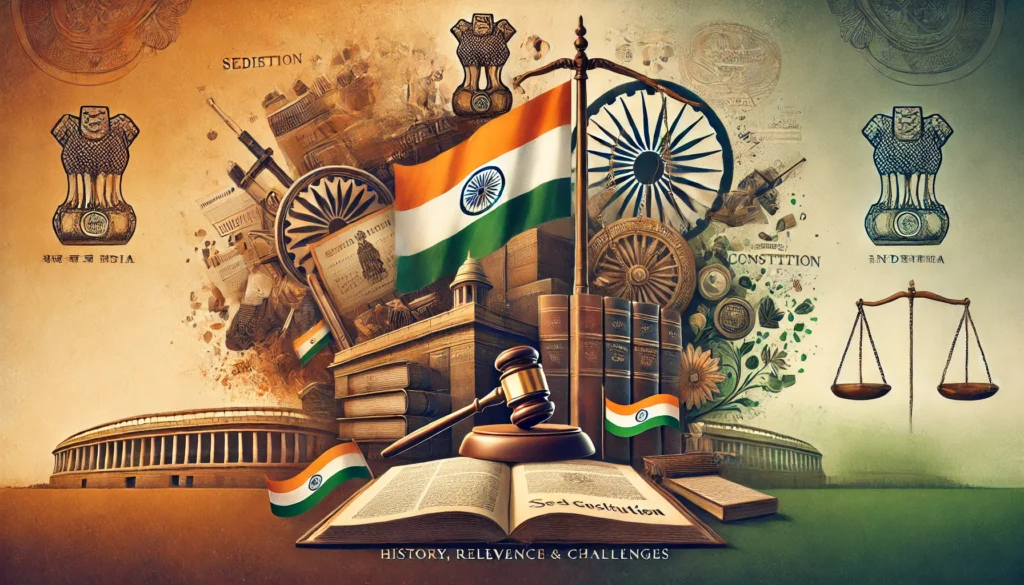Published on 20th April 2025
Authored By: Adv. Laxman Dagdu Palhal
Abstract
Defamation laws in India are designed to protect an individual’s reputation from false and malicious statements that may harm their dignity and societal standing. However, these laws must also contend with the fundamental right to freedom of speech guaranteed under the Indian Constitution. This article explores the framework of defamation laws in India, with an emphasis on balancing the protection of reputation against the need for open discourse and critique, especially in a democratic context. It discusses the legal provisions under both civil and criminal law, evaluates the role of the judiciary in interpreting defamation statutes, and examines the challenges posed by misuse and the chilling effects on free speech. Furthermore, it considers the arguments for and against the decriminalization of defamation and proposes potential reforms to better harmonize individual reputation protection with the right to free expression.
Keywords: Defamation, Free Speech, Indian Penal Code, Reputation, Civil Defamation, Criminal Defamation, Constitutional Law, Judiciary, Reform, Public Interest.
Defamation under Indian Law
In India, defamation is defined under Section 499 of the Indian Penal Code (IPC) and the civil law pertaining to defamation under the law of torts. The law of defamation essentially revolves around two key concepts:
- False Statement: For a statement to be defamatory, it must be false. Truth is a complete defense to defamation in Indian law.
- Harm to Reputation: The statement must harm or have the potential to harm the reputation of an individual, group, company, or institution.
Criminal Defamation under the Indian Penal Code (IPC)
Section 499 of the IPC defines defamation in a criminal context, and Section 500 provides the punishment for defamation. The essential components of Section 499 are:
- Defamation of any person: If the statement, whether made orally or in writing, harms or is likely to harm a person’s reputation, it is considered defamation.
- Exceptions: Section 499 also provides several exceptions where a statement, though defamatory, will not be punishable. For example, fair criticism of a public official or a person in a public position in matters concerning their public duties is not considered defamatory. Similarly, any statement made in good faith for the benefit of the public may not amount to defamation.
Criminal defamation is a non-cognizable offence, meaning it does not permit immediate arrest without a warrant. However, the person accused of defamation may face imprisonment for up to two years, a fine, or both. The burden of proof lies with the defendant to prove the truth of their statement or demonstrate that the statement was made in good faith.
Civil Defamation
Civil defamation, unlike criminal defamation, focuses on compensating the aggrieved party for the harm done to their reputation rather than punishing the accused. Under civil law, an individual can file a defamation suit in a civil court seeking compensation for the harm caused by defamatory statements.
The aggrieved party can claim damages, and the court may issue an injunction to prevent the further publication or dissemination of the defamatory statement. The plaintiff must prove the following elements to succeed in a civil defamation claim:
- The statement was defamatory.
- The statement was made with knowledge that it was false or with reckless disregard for the truth.
- The statement caused harm to the reputation of the plaintiff.
Defamation and Free Speech
India’s legal system recognizes the importance of free speech as a fundamental right under Article 19(1)(a) of the Constitution. However, this right is not absolute. Article 19(2) imposes reasonable restrictions on the right to freedom of speech in the interest of public order, decency, morality, and the protection of the reputation of others. It is this tension between free speech and protection of reputation that forms the core of defamation law in India.
While defamation law aims to protect an individual’s reputation from baseless attacks, it must also ensure that free speech, including the right to criticize and express dissent, is not stifled. In this context, the courts have played a significant role in shaping the law, often balancing the competing interests of reputation and free speech.
Judicial Interpretation of Defamation Law
Indian courts have had to navigate the complex relationship between defamation and free speech in several landmark cases. Below are some notable judicial pronouncements on defamation:
- Subramanian Swamy v. Union of India (2016): In this case, the Supreme Court upheld the constitutionality of criminal defamation under Sections 499 and 500 of the IPC, observing that defamation is a reasonable restriction on free speech in the interest of protecting a person’s reputation. The Court stated that “reputation of an individual is an important facet of his or her right to life and personal liberty under Article 21 of the Constitution.”1
- Rajagopal v. State of Tamil Nadu (1994): This case was significant in recognizing the importance of the freedom of the press in a democratic society. The Supreme Court held that the freedom of speech of journalists and media persons is not absolute and must be balanced against an individual’s right to reputation. The Court emphasized the importance of responsible journalism in ensuring that public figures are not subject to defamatory statements based on falsehoods.2
- Bennett Coleman & Co. v. Union of India (1973): The Supreme Court held that restrictions on free speech must be justified by public interest, and that criticism of the government should not automatically amount to defamation. The Court emphasized the need for safeguards to prevent defamation claims from curbing freedom of expression.3
Challenges and Criticisms of Defamation Law
While defamation laws in India aim to strike a balance between reputation and free speech, they have been the subject of considerable debate and criticism.
- Chilling Effect on Free Speech: Critics argue that defamation laws are often misused to suppress dissenting voices, particularly by powerful individuals, corporations, and political figures. The mere filing of a defamation case can have a chilling effect on free speech, as the accused may face lengthy litigation, reputational harm, and financial strain even if the case is ultimately dismissed.
- Vague Definitions: Some critics contend that the definition of defamation under Indian law is overly broad and vague. For example, the phrase “likely to harm” in Section 499 leaves room for subjective interpretation, which could lead to disproportionate legal actions against expressions that may not necessarily cause any real harm.
- Inconsistent Application: There are instances where the application of defamation law has been inconsistent. Public figures, for example, are sometimes shielded from defamation claims by the courts under the notion that criticism of public officials is essential for the functioning of democracy. However, ordinary citizens may not have the same level of protection and may be left vulnerable to defamatory actions.
Reforming Defamation Laws
Several reforms have been suggested to address the concerns surrounding defamation laws in India:
- Strengthening Protections for Free Speech: A clearer distinction should be made between malicious defamation and legitimate criticism. Reforms should focus on ensuring that the defamation law does not curtail free speech and does not become a tool for silencing public dissent.
- Increased Burden of Proof for Plaintiffs: To ensure that defamation cases are not used frivolously, it has been suggested that the burden of proof should rest more heavily on the plaintiff, especially in cases involving public figures and media houses.
- Decriminalization of Defamation: There have been calls to decriminalize defamation, arguing that it should only remain a civil matter. Decriminalization could reduce the chilling effect on free speech, particularly on journalists and activists who may be intimidated by the threat of criminal prosecution.
Conclusion
Defamation laws in India serve a critical role in protecting an individual’s reputation, which is a vital component of personal dignity and public trust. However, these laws must be carefully balanced with the right to free speech, which is equally important in a democratic society. While the Indian judiciary has made efforts to balance these interests, there is still room for reform to ensure that defamation laws do not become a tool for suppressing free expression. The challenge lies in safeguarding individuals’ reputations while promoting a robust and vibrant public discourse, which is essential for the functioning of democracy. As India continues to navigate these complex issues, the ongoing debate over defamation laws will remain a critical one for both legal scholars and citizens alike.
References
- Subramanian Swamy v. Union of India (2016) 7 SCC 221.
- Rajagopal v. State of Tamil Nadu (1994) 6 SCC 632.
- Bennett Coleman & Co. v. Union of India (1973) 2 SCC 788.



